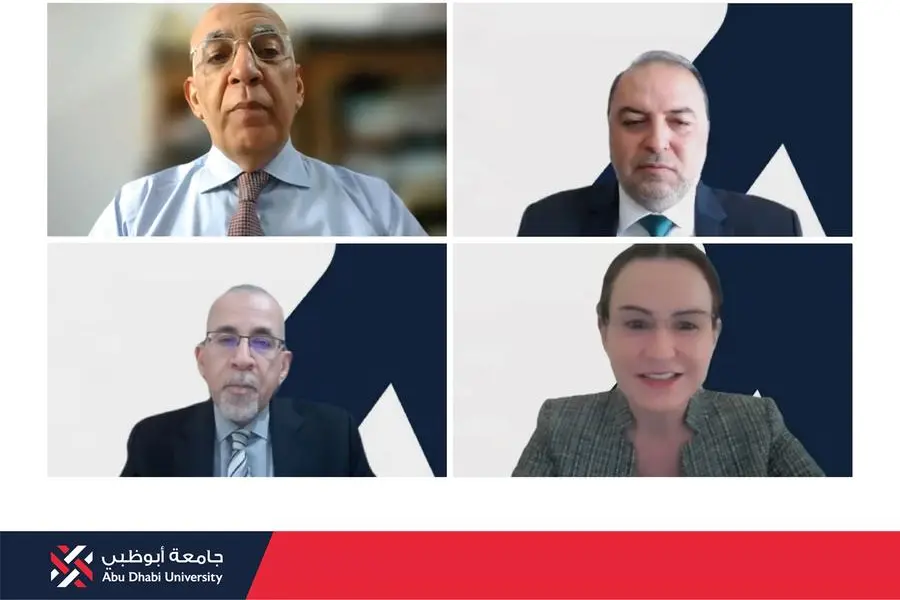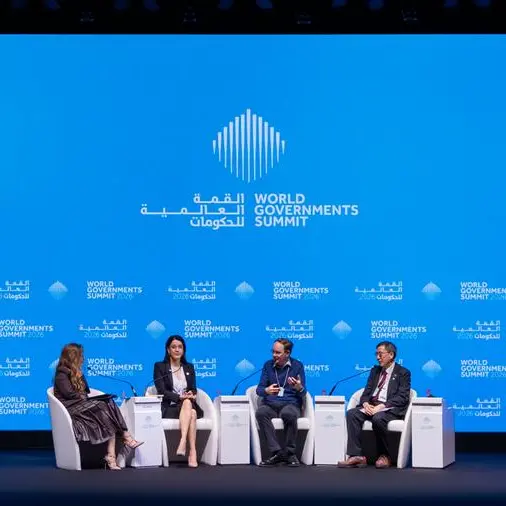PHOTO
- Abu Dhabi University organized the event in collaboration with the Regional Center for Educational Planning – UNESCO and the Queen Rania Teacher Academy
Abu Dhabi, United Arab Emirates: Under the patronage of H.E. Hussain Ibrahim Al Hammadi, the Minister of Education in the UAE and in partnership with the Regional Center for Educational Planning – UNESCO and The Queen Rania Teacher Academy (QRTA), Abu Dhabi University (ADU) hosted the fifth Educational Forum, under the theme “Re-imagining Education.”
ADU faculty members in addition to members from the World Bank, UNESCO, QRTA, and USA’s Drexel University attended the Forum as speakers. The Forum discussed the challenges facing schools and explored post-COVID-19 educational opportunities such as taking education out of the confinements of classrooms and into distance learning, providing equal access to academic opportunities and harnessing data and technology to strengthen teaching and learning.
During the Forum, H.E. Hussain Ibrahim Al Hammadi, the Minister of Education, noted that reimagining the future of education has become a rising topic that is garnering a high level of attention from educational decision-makers and various educational systems in light of the disruption caused by the COVID-19 pandemic. According to insights, COVID-19 served as a warning bell that stressed on the imperative need to reform educational systems by employing and incorporating technology as a basic and essential foundation for sustainable education.
Al Hammadi added: “A feasible and successful educational system is characterized by its flexibility in adapting to emerging situations, in addition to its ability to provide educational options, efficient professional development, and qualitative disciplines. The UAE’s wise leadership has continuously supported the educational system, which highly contributed to its unique technical and logistical capabilities. These same capabilities enabled the system to easily overcome the difficulties caused by the pandemic with minimal educational losses, which allowed students to continue their learning journey with obstacles.”
Professor Waqar Ahmad, Chancellor of Abu Dhabi University (ADU), said during his opening speech at the Forum: “The Covid-19 pandemic has contributed to changing the way we educate and assess students, the student experience and the way we conduct research and external engagement in a positive way. The changes offered opportunities to focus on adding value rather than imparting knowledge. Our experience opened up new prospects in providing virtual and more connected services, bringing more innovation and research in education, and enabling remote collaborations.”
Dr. Osama Obeidat, CEO of the Queen Rania Teacher Academy, said: “On behalf of Queen Rania Teacher Academy-QRTA, we are thrilled to partner with Abu Dhabi University (ADU) and the Regional Center for Educational Planning – UNESCO on this Forum for the second year in a row. Reimagining our educational system is no longer a luxury but a necessity and even a matter of continuity for countries that want to thrive, improve or even maintain their competitive edge in the coming years. Reimagining education means we have to think differently and be decisive and firm in our reform decisions.”
H.E Mahra AlMutaiwei, Director of the Regional Center for Educational Planning – UNESCO, commented on the Forum about Redesigning Educational Systems, said: “Since its establishment, the regional center has been keen to build a network of strategic partnerships on a national, regional and global level. This is to facilitate the adoption of many projects, initiatives and strategies that would upskill talent in the field of planning, propagate and publish best practices and raise awareness on the development of educational systems and policies.”
AlMutaiwei added: “It is paramount for educational systems to adopt different teaching methods inspired by key learnings of the pandemic. This includes ensuring that alternative educational plans are available to maintain education continuity in all crises, achieving high-quality educational opportunities for all students at all levels, and focusing on lifelong learning and remote learning of all kinds. As such, schools need to direct efforts on developing their infrastructure and technology, with different specializations that are capable to keep pace with technological advances, and building frameworks and metrics that guarantee that both traditional and distance learning are up to quality standards. Additionally, it’s important to focus on students in an integrated manner in terms of knowledge, skills, professionalism, academia and psychology, and to provide them with the necessary support to continue their learning process and build their future.”
The Forum witnessed the participation of more than 500 academics and students from across the region and the world.
For more information about Abu Dhabi University, please visit: https://www.adu.ac.ae/
-Ends-
About Abu Dhabi University:
Established in 2003, Abu Dhabi University (ADU) is the largest private university in the United Arab Emirates. With campuses across Abu Dhabi, Dubai, Al Ain, and Al Dhafra, the University has a total enrolment of 7,800 students from over 80 nationalities. Structured into Colleges of Arts and Sciences, Business, Engineering, Law, and Health Sciences, ADU offers undergraduate and graduate programs across a wide range of disciplines.
Abu Dhabi University is recognized as a world-class institution committed to excellence in teaching, research, and student experience, as evidenced by its prestigious regional and international accreditations. The University was the first private higher education institution in the GCC to earn international accreditation from the Californian Western Association of Schools and Colleges (WASC). ADU’s College of Business is accredited by the Association to Advance Collegiate Schools of Business (AACSB) and the prestigious EFMD Quality Improvement System (EQUIS). At a program level, the College of Engineering has received international accreditation from the world-renowned Accreditation Board for Engineering and Technology (ABET), and the Bachelor of Architecture has received Part 1 validation from the Royal Institute of British Architects (RIBA). The College of Health Sciences has earned accreditation from the Agency for Public Health Education Accreditation (APHEA).
According to the 2021 QS World University rankings, Abu Dhabi University ranked among the top 750 universities in the world and placed among the world’s top 150 universities under 50 years of age. ADU also earned a top 3 spot globally for international faculty and maintained its long-held position as part of the top 11 universities worldwide recognized for student body diversity.
Media Contacts
Weber Shandwick for Abu Dhabi University
Sara Farrah
Sfarrah@webershandwick.com




















